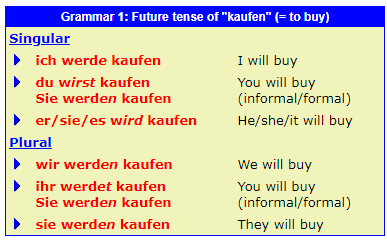Formation of the future tense
The German future tense is formed by using the present tense of the auxiliary verb "werden" followed by the infinitive of the verb in question:

Notes on word order
1. The infinitive of the main verb in the future tense should always be placed at the end of a clause or sentence.
Aber sie wird nicht mehr hier sein.
(But she won't be here any more.)
Marlene wird Mitte Oktober ausziehen.
(Marlene will be moving out in the middle of October.)
2. When a clause is "inverted" - i.e. in a question or when an adverb is the first element -, the auxiliary verb "werden" precedes the subject and the infinitive is again placed at the end of the clause.
Wann wirst du einziehen?
(When will you move in?)
Natürlich wird Marlene den Wecker und den Computer mitnehmen.
(Of course Marlene will take the alarm clock and the computer with her.)
Ab dem kommenden Semester werde ich hier Jura studieren.
(From this term onwards I shall be studying law here.)
3. It is not necessary to repeat the auxiliary verb "werden" when the same noun is the subject of two or more future verbs in the same sentence.
Sie wird heiraten und dann in ein Zweifamilienhaus umziehen.
(She will get married and will then move into a semi-detached house.)  英语
英语 日语
日语 韩语
韩语 法语
法语 西班牙语
西班牙语 意大利语
意大利语 阿拉伯语
阿拉伯语 葡萄牙语
葡萄牙语 越南语
越南语 俄语
俄语 芬兰语
芬兰语 泰语
泰语 丹麦语
丹麦语 对外汉语
对外汉语

